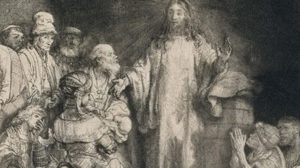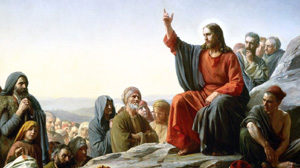Scripture:
Jeremiah 17:5-10
Luke 16:19-31
Reflection:
In this story Luke tells us that possessions are not a hindrance to discipleship, but brings additional responsibilities on those who possess it. It also happens that the “Pharisees were lovers of your monies.” (16:9) . The Pharisees derided Jesus when he told them this. In fact, literally Luke says that they “turned up their noses at Him!” In Judaism possessions material possessions were supposed to be a sign of God’s favor. In this story, the Pharisees are presented here as a slave to their possessions.
Jesus tells the Pharisees to make friends with the mammon as wickedness. That is make wise use of your wealth otherwise it will possess you and make you its slave. Jesus continues to teach that the great acts of religion are Prayer, Fasting, and Alms. In other words we are all called to serve the poor.
Recently, Pope Francis was asked about what to do when the panhandlers on the streets ask you for money. Pope Francis recommended that you give him/her something if you are able. The questioner says he would hesitate to do this because the money is likely to be used unwisely. Pope Francis suggested that it is better to give something to the panhandler than not to give. It is always better to respond in a spirit of compassion and not worry about how the money is used.
Jesus tells the story of the Lazarus and Dives. This is the only parable in which the name of the recipient of the miracle is given a name, i.e. “Lazarus” (God helps). In the Septuagint the rich man is named “Dives” In the parable Dives is introduced first. He is dressed in “purple!” Purple was a color used only for ranking Roman Officials.
Lazarus is covered with open sores. He obviously is disabled, because he is “thrown” before the gates of Dives home. All he desires is to eat the scraps intended for the dogs. It was the crumbs of bread the diners used to clean the grease off their hands, and was thrown under the table for the dogs. The dogs were allowed to lick Lazarus’ wounds. It is not clear how Lazarus dies. It could have been from freezing, or disease or starvation.
Both Dives and Lazarus die. Lazarus is “carried away” and Dives simply “dies!” In the first part of the parable Dives was introduced first then Lazarus. In this the second part of the parable Lazarus is introduced first then Dives! For the first time a dialogue enters the story. However, it is not between Lazarus and Dives, but between Abraham and Dives. Abraham speaks for the Lazarus, the beggar who had no voice. On earth he never asked for anything. Here in the “bosom of Abraham” he says nothing.
Dives asks Abraham to send Lazarus to provide him with a glass of water. Even in heaven Lazarus is a servant! Dives knows Lazarus’ name. Dives is so bold that he calls himself “Abraham’s son!” Dives asks that Lazarus go and tell his brothers that they must change their lives. Abraham says “No!” There are not privileges for those who ignore the poor at their door.
Fr. Ken O’Malley, C.P., is the formation director and local superior at Holy Name Passionist Community in Houston, Texas.






